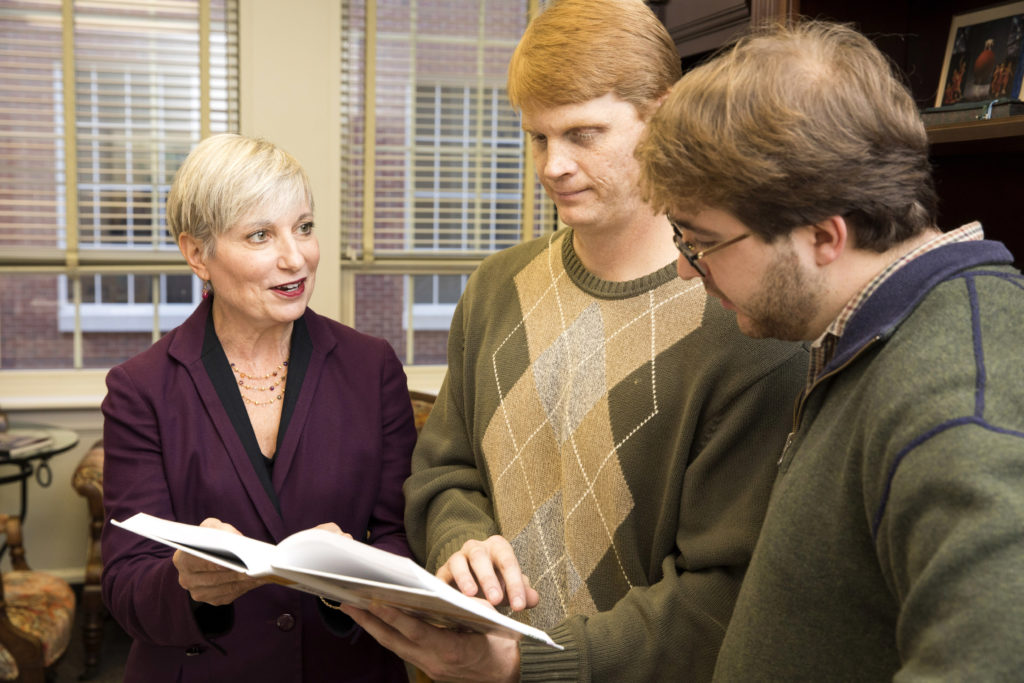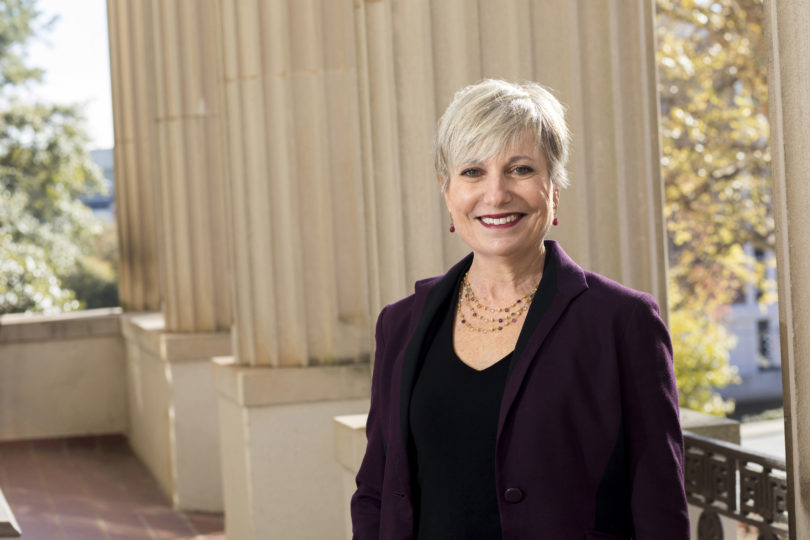Katherine Willoughby, a professor in the School of Public and International Affairs, gives students a global perspective on public budgeting and management.
Where did you earn degrees and what are your current responsibilities at UGA?
I earned a Bachelor of Science degree in psychology from Duke University in 1980, a Master of Public Administration degree with a concentration in public budgeting and finance from NC State University in 1984, and a Ph.D. in public administration with a concentration in public budgeting and finance from the University of Georgia in 1991.
In 2017, I was hired as the Margaret Hughes and Robert T. Golembiewski Professor of Public Administration in the department of public administration and policy at UGA to conduct research, teach and to provide service and leadership. I came from Georgia State University, where I worked as a professor of public management and policy for 28 years. I feel I have come full circle because I received the Robert T. Golembiewski Award for outstanding doctoral students in public administration when I was a graduate student in our department three decades ago.
When did you come to UGA and what brought you here?
I first came to UGA in 1984 when I followed my college boyfriend, Dan Willoughby. He had returned to his native Georgia from North Carolina to attend the UGA School of Law. By then, I was in the Master of Public Administration program at NC State University in Raleigh on the recommendation of my mother, who went through the program to advance in her own career as an administrator with North Carolina’s Department of Environment. At NC State, I took public financial management with Charlie Coe, who had just received his doctorate in public administration from UGA. He noticed that I was driving down to Athens frequently and suggested that I apply into the program, as well. I did, was accepted and arrived on the UGA campus to study public administration and budgeting from the best—professor Tom Lauth, founding dean of the School of Public and International Affairs.
What are your favorite courses and why?
Public budgeting courses are my favorites. Governments can only operate if they can raise revenues. If you understand public funds flow, you better comprehend how governments can and do work. I introduce students to budgeting around the world—raising their awareness of legal foundations and contextual oddities of taxing and spending by industrialized and developing nations. Also, you never run out of material. There is always something going on related to public budgets—the good, the bad and the ugly—that we can discuss and learn from.
Teaching public management is fantastic, too. I authored an e-book that can be updated in real time to introduce my students to current public management events. For example, the book’s first chapter assesses the Flint, Michigan, water crisis. This man-made disaster illustrates very clearly that public management matters and that poor or non-existent management affects peoples’ lives in real, dramatic and expensive ways.
What are some highlights of your career at UGA?
Winning the national award from NASPAA for most outstanding scholarship in public administration as a student in 1991 was an early highlight. During my Ph.D. program, I met with my major professor, Tom Lauth, explaining my desire to conduct research about the decision orientations of local government budget analysts. I had worked as a local budget analyst intern in North Carolina as an MPA student. Tom thought I had a great idea but steered me to examine analysts at the state-level and pointed me to various research methodologies. His guidance helped me produce an award-winning dissertation.
Now as a faculty member in public administration and policy, I love working with our exceptional doctoral students as they carve out their own research agendas. It is an honor to be part of their journey in the academy, and I strive to be as impactful in my guidance to them as Tom was to me years ago.
How do you describe the scope and impact of your research or scholarship to people outside of your field?
Having consulted with public officials and managers from governments all over the world for decades, I know policy and budgetary decision-makers seek what might work to address the many challenging problems they are attempting to solve. For example, my most recent book with Elaine Lu (professor at City University of New York) addresses how state juvenile justice agencies apply performance budgeting to improve return on investment. This is a vital, very timely state function to study, given escalating costs coupled with dramatically changing service delivery considerations such as moving youth from incarceration to “natural” or community care. Recently, the front page of the Atlanta Journal-Constitution noted that a “lack of staff plagues Georgia’s juvenile jails.” Our book uses evidence-based analysis as well as testimony from those “in the trenches” to decipher how metrics can support better budgeting and management for juvenile justice. Hopefully, my research helps governments achieve better results.
How does your research or scholarship inspire your teaching, and vice versa?
After teaching public budgeting for years, I felt students were short-changed with traditional texts limited to techniques of practice, foci on the United States and/or highlighting executive and legislative budgeting only. I wrote “Public Budgeting in Context,” a book I now use, to introduce students to foundations and practices of budgeting in countries around the globe and at every level of government in the United States. Also, the book assesses the budgeting orientations and influences of executive, legislative and judicial branches of government, as well as those of the media and the public.
For the book I just completed about performance budgeting in state governments, I enlisted students in my public budgeting course this past spring to contribute to the research. Students were paired for a term project where they examined how performance budgeting is engaged for juvenile justice programming in their assigned state, all of which have performance budgeting laws.

Katherine Willoughby talks with doctoral students Andrew Grandage, left, and Robert Hines. (Photo by Dorothy Kozlowski/UGA)
What do you hope students gain from their classroom experience with you?
I hope students in my courses consider that they confronted significant challenges and came out victorious. Today, we are bombarded by concurrent, consecutive cataclysmic events and we are constantly interrupted. I hope my students learn how to navigate well in a learning environment so characterized that requires critical thinking and strategic decision-making. Some of the following evaluations by students in my classes attest to my “disrupted” classroom that prepares students for a very real “disrupted” state:
— “I feel like I was catching up the entire semester. There was always something new I didn’t understand.”
— “I didn’t love the group assignment, but it was helpful in exploring what a mess public budgeting can be.”
— “… a few ‘ambush’ assignments left me scrambling to complete them.”
— “Many of us felt blindsided by the exams. The first exam was painful due to the time constraint. But, I learned a lot.”
Describe your ideal student.
Given my style of teaching, students taking my courses need to be aggressive learners. By this, I mean they should squeeze everything out of the course, both in and out of the classroom. I admire students who are open minded, curious, flexible and generous vis-à-vis other classmates in terms of sharing their own time and knowledge. In an effective class, students contribute to but do not monopolize discussions; this means having a willingness to really listen and interpret the views of others. Stating “I don’t know” is perfectly OK, but be ready to jump right into the search for answers.
Favorite place to be/thing to do on campus is…
In Baldwin Hall, working with students and catching up with my colleagues, or in class, on both the Athens or Gwinnett campus, teaching and mulling over ideas and concepts about public management, budgeting and the wonder of government with students.
My perfect day when not on campus…
It begins with exercise, one minute for every year I have been alive (meaning an hour). I pushed my 90-year-old parents to move from North Carolina to Georgia three years ago, and I enjoy taking them treats like sliced watermelon or fresh berries. I love being near them in their twilight. I still learn something new about them on these visits. Time is then usually devoted to work—grading papers, completing an article review or writing up my own research. I adore walking through the woods with my Labradors, brothers Alexander Hamilton (chocolate) and Patrick Henry (black). The end of a perfect day involves grilling on our back patio with Dan and any of our adult children and friends who might be available. We are lucky that our two sons (including a UGA law grad) live and work in Atlanta and our daughter is in graduate school at Georgia!
Community/civic involvement includes…
I love working with my faculty colleagues and our students on service projects that introduce various areas of public work. Such projects can be volunteering at the Athens Food Bank, working at local gardens and small farms, and contributing to building and upgrading homes with Habitat for Humanity. I have a great time learning about the work involved, meeting and getting to know our students better and sharing time with other faculty members.
Favorite books/movies (and why)?
I love reading about the human condition, family relationships and the need to endure. Some favorites include:
- “The Last of the Mohicans” by James Fenimore Cooper, for its vivid descriptions of devastating human brutality vis-à-vis the spectacular natural beauty of our country in its infancy.
- “1776” by David McCullough, for its celebration of the grit, courage and intelligence of George Washington.
- “Alice” by Stacy Cordery, for its shock value—Teddy Roosevelt’s daughter was pretty provocative.
- “Candide” by Voltaire, for its message to be curious yet flexible, and to remain true to yourself. Life is a beautiful, albeit chaotic, journey.
My favorite movies include “The Godfather” series and the “Alien” series. My all-time favorite scene, for its empowering message, is in “Aliens” (1986) when Ripley (Sigourney Weaver) dons a massive equipment mover and battles the alien, manipulating the mover with her thumbs. Great power, deftly and strategically engaged, can save the world!
UGA experiences I will always remember include…
In 1984, Dan and I attended the Georgia-Clemson football game and watched Kevin Butler make a 60-yard plus a foot and a half field goal to beat the Tigers!
Annually, gaining inspiration at the Getzen Lecture on Government Accountability held in the Chapel. An exceptional speaker was Alice Rivlin in 2007, the first director of the Congressional Budget Office (1975-1983) and later head of the Office of Management and Budget during the Clinton administration. She is the first to direct budget offices for the U.S. legislative and executive branches of government.
Today, every time a student informs me they received an offer from a public agency to be an analyst, researcher, planner, first responder, manager or director. It is their reward for studying in our field and undoubtedly starts them on a spectacular career in public management and policy. I want their dreams to come true, as mine have.
(Originally published on Jan. 13, 2019)






